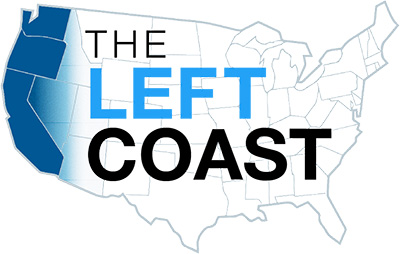
Arizona Republican gubernatorial nominee Kari Lake speaks to supporters during her election night event at the Scottsdale Resort at McCormick Ranch on November 8, 2022 in Scottsdale, Ariz.(Justin Sullivan / Getty Images)

We’d been warned for weeks by pollsters of a “red wave” in Tuesday’s elections, possibly even a late-breaking tsunami. Instead, the GOP ended up with a rather minor ocean disturbance, the sort of event that no self-respecting surfer would bother paddling out to sea for.
Witness what happened in Maine, where the vastly unpleasant, self-identified “Trump-before-Trump” ex-governor Paul LePage attempted a political comeback, fueled by the worst kind of scapegoating, grievance politics, only to be trounced by incumbent Governor Janet Mills. That result, alone, was enough to make me yawp with glee Tuesday night. Or in Ohio, where QAnon-ist congressional candidate J.R. Majewski was handed a resounding defeat by the Democrats. Or in Colorado, where the sophomoric-yet-fascist Lauren Boebert has, apparently, been given the Bronx cheer by her constituents. Or in all of the Rust Belt swing states, where election-denying candidates for governor and secretary of state fell far short of achieving power.
None of that looks like a “wave” for Trump and his vindictive alt-right minions, or for the cowardly GOP congressional leadership who hoped they could ride the Trumpian, election-denying tiger without alienating independents. But the ripples out West merit some attention.
Reporting elections in the Western states the morning after the vote can be an exercise in frustration. In California, Arizona, Nevada, Oregon and Washington, mail-in voting is such an entrenched part of the voting process now that it’s hard to get an accurate bead on where things are even 24 hours after polls close. In both Arizona and Nevada, mail-in votes are tabulated before in-person, and, since they skew Democratic, it can create the illusion in the first hours of vote counting that Democrats are doing better than they in reality are.
On Tuesday evening, it briefly looked like Catherine Cortez-Masto, the embattled Democratic Senator from Nevada, was going to be able to hold off her GOP opponent, Adam Laxalt. By Wednesday morning, as more in-person votes were added in, it became increasingly likely that Cortez-Masto would lose, as would Democratic Governor Sisolak, and that it was entirely possible that the GOP’s extremist candidate for secretary of state, Jim Marchant, would also come out on top, albeit by a small margin.
Similarly, for a brief moment on Tuesday night, it looked as if Katie Hobbs, the Democratic candidate for governor in Arizona, who aroused the wrath of many voters by refusing to debate her opponent, would buck all the polls and defeat the Trumpist Kari Lake. By Wednesday morning, she was clinging to a minuscule lead, with trends favoring Lake to eventually eke out a narrow win. If Lake does take the governorship, election-deniers could ride her coattails to win the attorney general and secretary of state offices as well.
Given the failures of election-denying candidates in the other presidential swing states, the results in the two Western desert states will likely increase their importance in the right-wing ecosystem. They will, if the election deniers claim victories, become the go-to states for vote suppressors looking to make mischief and to institutionalize bad ballot-access policies between now and the next presidential election. For months now, the alt-right has hyped Lake as a potential vice-presidential candidate in 2024 and a presidential candidate in the cycles after that. If Lake ultimately comes out on top in her race, it will surely cement her influence as a rising star on the right. A DeSantis-Lake ticket in 2024 would not be out of the bounds of the possible.
California, by contrast, isn’t exactly friendly turf for Republicans. Democrats may not end up flipping many GOP congressional seats this time around, but they won’t lose their swing seats either. Despite worries that at least one statewide office could see a strong Republican showing this year, it looks like all the statewide offices will stay Democratic.
But, for the California races that are close, the results won’t be known for days. The state allows mail-in ballots to be counted for a week after the election, so long as they were post-marked by Election Day. In consequence, a number of knife-edge congressional contests in the Orange County and San Diego suburbs as well as the marquee race for Los Angeles mayor won’t be declared anytime soon.
In Oregon, because of the presence of a spoiler candidate and massive voter discontent with incumbent Governor Kate Brown, Republicans had a real opportunity to pick off a governorship in a deep-blue state. The outcome of this nail-biter of a governor’s race conceivably also won’t be known for days. With three-quarters of the votes cast, Democrat Tina Kotek was roughly 1 percent ahead.
Oregon’s gubernatorial contest and the LA mayor’s suggest Democrats should temper their giddiness at the national results with an awareness that out West, progressive Democrats risk losing key segments of the electorate. Voters are soured on incumbents who seem chronically unable to offer workable solutions to the crisis of homelessness and, more generally, the lack of affordable housing, and they are angered by a perception that crime is rising and that local leaders haven’t thought through ways to respond to public safety concerns. Those certainly were motivating factors for voters in Oregon, and Caruso’s late surge in the polls in Los Angeles—a surge accelerated by the vast sums of his own money that the candidate threw into the race—was also driven by concern over these two issues. While California voters gave the thumbs down to most ballot initiatives this year, local ones, like Measure O in Sacramento, which give law enforcement more leeway to clear homeless encampments, gained traction.
On balance, Tuesday turned out to be a surprisingly good day for Democrats. But in Western states, there are warning signs that the Democratic coalition is brittle, and that voters aren’t averse to veering rightward if they think that their fears over crime, inflation, homelessness, and other key issues aren’t being fully addressed by the party’s leaders.
Sasha AbramskySasha Abramsky is The Nation's Western correspondent. He is the author of several books, including The American Way of Poverty, The House of Twenty Thousand Books, Little Wonder: The Fabulous Story of Lottie Dod, the World's First Female Sports Superstar, and most recently Chaos Comes Calling: The Battle Against the Far-Right Takeover of Small-Town America. Follow him on Bluesky at @sashaabramsky.bsky.social.